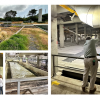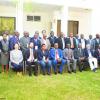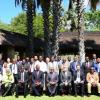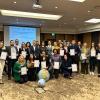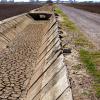News
Displaying Results 1 - 16 of 16
Zimbabwe, a landlocked country in Southern Africa, lies entirely within a total of five transboundary river basins (Buzi, Limpopo, Pungwe, Save and Zambezi) and one international lake (Kariba) while the number of transboundary aquifers is yet to be ascertained. These transboundary basins create…
Representatives from countries across Central Asia and experts on the climate and clean air came together in Astana, Kazakhstan this week (11-13 June 2024) for the Sub-Regional Workshop on Integrated Planning for Climate and Air organized by the UNEP-convened Climate and Clean Air Coalition (CCAC)…
Mediterranean countries come together to increase climate resilience of water and sanitation sectors
The Mediterranean region is warming 20% faster than the global average and for every 1-degree global temperature increase, it would warm up by at least 1.5-2 degrees. This is severely impacting water and sanitation and the health and well-being of the region’s population. According to the World…
Addressing ministers at the 2024 International Transport Forum Summit (ITF24) in Leipzig, UNECE Executive Secretary Tatiana Molcean recalled that 152 United Nations Member States are contracting parties to at least one of the 61 transport conventions hosted by UNECE. These legal instruments help to…
Extreme weather events exacerbated by climate change increasingly threaten the ability of countries worldwide, including those in the UNECE region, to sustain safe, reliable, and equitable transport and mobility.
Adapting to future impacts of climate change is therefore no longer a concern to be…
In the face of global crises, progressing towards Sustainable Development Goal (SDG) 16—promoting peaceful, inclusive societies, justice for all, and accountable institutions—is a cross-cutting enabler for the 2030 Agenda. SDG16 intertwines with the other SDGs, underscoring the importance of…
Iraq grapples with severe water challenges exacerbated by climate change, population growth, upstream dam construction, and decades of conflict and instability. The Euphrates and Tigris rivers, vital lifelines for the region’s agriculture, ecosystems, and communities, face increasing threats from…
The Water Convention has facilitated the First round of Technical & Planning Negotiations of the Draft ‘Agreement on the Establishment of the Luapula River and Lake Mweru Authority between the Democratic Republic of Congo (DRC) and Zambia on 18 and 19 April, concerning the transboundary Lake…
Preventing accidental water pollution remains a key challenge for many countries within and beyond the UNECE region. Approximately 60% of the world’s freshwater flows occur in transboundary river basins where 40% of the world’s population live. Countries rely increasingly on transboundary water…
On 29 February 2024 Zambia declared a National Crisis and Emergency regarding a drought gripping the country and which has decimated food and energy supply. Other Southern African countries have declared similar National Emergencies due to severe drought, including Zimbabwe in April. Severe…
Much of Chad's water resources are shared, notably the Lake Chad basin and its many tributaries and distributaries (shared with Cameroon, Central African Republic, Libya, Niger, Nigeria, Sudan and Algeria), the Niger River basin (shared with Benin, Burkina Faso, Cameroon, Côte d'Ivoire, Guinea,…
Guaranteeing safe access to drinking water and sanitation remains a challenge in the pan-European region, with 16 million people still lacking access to basic drinking water services and over 29 million people not having access to basic sanitation, including hundreds of thousands who have to…
Around 3.6 billion people live in contexts that are highly vulnerable to climate change and many of them are in transboundary basins. Droughts do not recognize borders, pose transboundary risks, and require cooperation to address them. The 6th IPCC assessment (2022) and the IPCC synthesis (2023)…
The impact of different air pollutants on vegetation and crops has been studied for over 35 years in the framework of the UNECE Convention on Long-range Transboundary Air Pollution, through its International Cooperative Programme on Effects of Air Pollution on Natural Vegetation and Crops (ICP…
Risk is a part of our everyday lives. When we wear a helmet to ride a bike, for example, we accept a small inconvenience to reduce the risk of a fall or an accident. When a homeowner decides to retrofit their house, they incur a cost to shield against an earthquake or a flood. Faced with the COVID…
Every year we lose about 14% of the food produced before it is sold, and this does not even include the food never harvested. Even more is wasted at retail and consumer levels. At the same time, over 800 million people worldwide suffer from hunger, while food loss is a major contributor to CO2…




